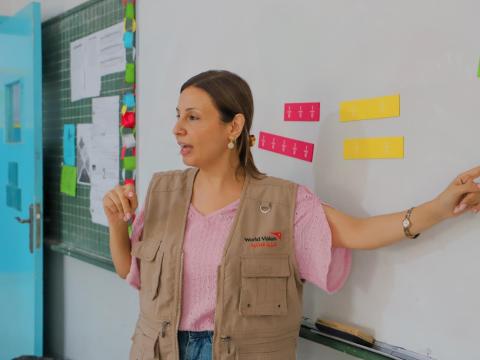Teachers are lifelong learners

By Elio Haddad, Technical Officer for Education at World Vision Lebanon
Remember the time you looked at the gym’s mirror and saw no change, even after several weeks of training? You probably found yourself at a fork in the road and asked yourself: What if I was not built for this?
Despite your disappointment, you continued working out for a couple of months. Suddenly, you were complimented by several colleagues about your weight loss on the same day. You remembered the cross-road you were at and asked yourself: What if being “built for this” was not the most important factor in the equation? What if the effort I put and the results I was able to achieve were more objective indicators to assess my potential?
The Professional Development Plan
Acknowledging that bringing about and sustaining change is no easy task, and after reflecting on the implementation of countless education learning cycles, World Vision Lebanon’s (WVL) education team developed and refined its teacher professional development plan which looks at the moment as follows:

The Story: Are Effective Teachers Born or Developed?
During the previous two years, World Vision Lebanon (WVL) implemented two consecutive learning cycles in one of the most marginalised and fragile areas in northern Lebanon. Sarab, a WVL teacher who taught during both years, scored 61% on the baseline observation during the first year. Most would have thought she was not built for the job. Benefitting from the professional development plan available to her as a WVL teacher, Sarab was able to achieve 75% on the end line observation that year - not a very noteworthy result, but a notable improvement.
Given that the project was extended for another year, our aim was to build on the capacities developed in year one during the second year. As such, Sarab was recruited again. Unsurprisingly, Sarab scored 75% at the beginning of year two. After year two’s trainings, observations, coaching, and teacher learning circles, she scored 88% at end line – both a noteworthy result and a significant improvement.
The Take-aways
Teachers’ starting point is not a hindrance to their improvement. Given the right quality and quantity of support and capacity building, teachers are able to develop irrespective of where they are (in terms of skills and knowledge) at the beginning of the learning cycle.
Professional development is sustained from a learning cycle to the next: Sarab scored the same grade (75%) at year one’s end line and year two’s baseline.
To achieve change, professional development cannot only be a one-time “shot” i.e. only a training. Just like the example in the introduction, the change that Sarab saw week in week out was very minimal. However, the improvement she was able to achieve on the long-term due to the continuous “drops” of professional development she received was substantial.
A final lesson learned was not to assess “success” itself, but what leads to success. Only assessing Sarab based on her baseline and end line results in year one would result in labelling her as an average teacher. Focusing on continuous professional development and checking Sarab’s participation in trainings, improvement during monthly observations, and engagement in coaching sessions and teacher learning circles led her to achieve what she was able to.
On this World Teachers’ Day, instead of asking whether a teacher is “built for this”, a more accurate question would be: “What do we (education practitioners, researchers, policymakers…) bring to the table i.e. what are we offering teachers in terms of capacity building and professional development?” Our take on the issue is: if development plans are continuous, individualised, comprehensive, and regularly revised, it makes little difference whether a teacher is “built for this” or not.